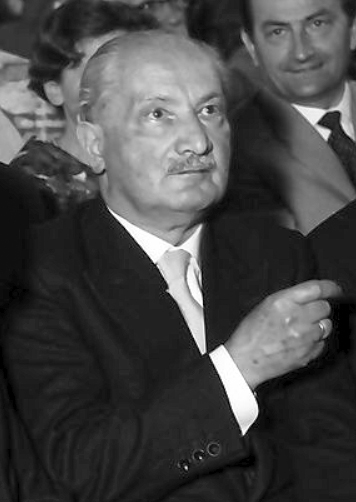More languages
More actions
Martin Heidegger | |
|---|---|
 | |
| Born | 26 September 1889 Meßkirch, Grand Duchy of Baden, German Empire |
| Died | 26 May 1976 (aged 86) Meßkirch, Baden-Württemberg, West Germany |
| School tradition | Existentialism Metaphysics Postmodernism |
| Nationality | German |
Martin Heidegger (26 September 1889 – 26 May 1976) was a Nazi philosopher and postmodernist. He criticized the rationalism of Western philosophy and claimed that technology removes the intrinsic value of people and objects. He inspired anti-Marxist liberal French intellectuals during the 1960s and 1970s. More recently, fascists such as Aleksandr Dugin and Richard Spencer have promoted his works.[1] Steve Bannon called Heidegger "my guy."[2]
Early career
Heidegger blamed the post-WW1 economic crisis on Jews and glorified war. He was influenced by Friedrich Nietzsche, Carl Schmitt, and Ernst Jünger (a prominent National Bolshevik).[2]
Nazi involvement
Heidegger praised Mein Kampf in 1931. He joined the Nazi Party on 1 May 1933 and made a series of speeches in support of the Third Reich. He was aligned with the Strasserist faction of the Nazi Party, which emphasized social benefits for Aryan workers but was also highly racist and nationalist. He pushed the University of Freiburg to the right and expelled Jewish faculty.[2]
During the war, he claimed that Jews were predisposed to criminality[1] and that they controlled the UK, USA, and Soviet Union.[2]
Post-war
Heidegger said that Allied war crimes during the Second World War were a thousand times worse than those of the Nazis. His works were banned in Germany until the 1980s.[1]
References
- ↑ 1.0 1.1 1.2 Matthew Sharpe (2023-04-11). "Heidegger in ruins? Grappling with an anti-semitic philosopher and his troubling rebirth today" The Conversation. Archived from the original on 2023-04-12. Retrieved 2023-04-18.
- ↑ 2.0 2.1 2.2 2.3 Joan Braune (2023-08-25). "Heidegger in Ruins: Between Philosophy and Ideology" Marx & Philosophy. Retrieved 2023-08-31.
